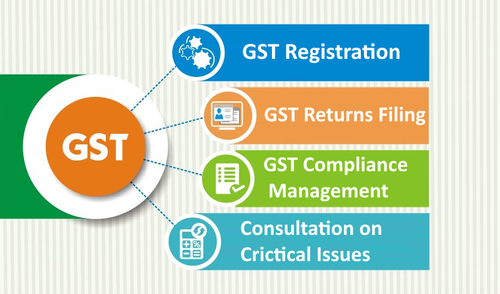Full Checklist for Efficient Singapore GST Registration
Full Checklist for Efficient Singapore GST Registration
Blog Article
Navigating the Intricacies of GST Enrollment: Expert Tips and Finest Practices for Easier Conformity
From figuring out registration needs to harnessing technical tools for structured procedures, the trip towards smoother GST compliance is nuanced and diverse. Remain tuned to uncover vital strategies and insights that can assist companies guide with the intricacies of GST enrollment with finesse and self-confidence.
Understanding GST Registration Demands

In enhancement to turnover limits, services engaging in interstate sales or giving taxed services may also be required to register for GST, also if their turnover is below the suggested restriction (Singapore GST Registration). Understanding these thresholds and demands is necessary to avoid fines and make certain smooth operations within the lawful framework
Additionally, companies should gather and prepare the essential documentation, such as evidence of identity, address, business unification, and savings account details, before starting the GST enrollment process. Stopping working to offer accurate info or meet the registration target dates can cause penalties or various other lawful effects. Companies should stay educated about the certain GST registration requirements relevant to their operations to keep compliance and prevent potential issues.
Organizing Crucial Documents
Companies starting the GST registration process have to meticulously assemble and arrange the crucial documents required for submission. The key records commonly needed for GST enrollment consist of proof of service enrollment or consolidation, address and identity proofs of the business owners or partners, savings account information, evidence of major business, and consent forms. Making sure that these papers are conveniently offered and arranged can simplify the registration process and protect against denials or delays.
To successfully organize vital documents, companies should produce a centralized system for saving and categorizing the called for paperwork (Singapore GST Registration). Making use of electronic storage solutions can assist maintain easy gain access to and ensure that documents are safely stored. Furthermore, developing a checklist of all necessary files can work as a helpful device to track what has actually been collected and what is still required for submission

Leveraging Technology for Efficiency
Enhancing operational performance with technological combination is paramount for modern-day businesses browsing the complexities of GST enrollment. One of the key means technology can assist in GST registration is through the use of automated software application options.
Furthermore, technology can help with smooth interaction with tax authorities. On the internet websites and communication tools enable organizations to send records, fix inquiries, and obtain updates in a much more effective manner. This not just quickens the registration process but likewise helps in preserving transparent and dependable interaction with the relevant authorities.
Additionally, cloud-based storage space options supply a safe and secure platform for businesses to shop and access their economic information, guaranteeing compliance with GST record-keeping demands. By streamlining data storage and automating processes, companies can enhance their general effectiveness and accuracy in GST registration procedures.
Proactive Conformity Surveillance

To make certain effective aggressive compliance tracking, companies should establish durable interior controls, conduct routine audits, and utilize automation devices for real-time tracking of GST deals. Regular training sessions for workers on GST compliance needs can also help in creating a culture of conformity within the organization. Additionally, engaging with tax obligation specialists or professionals can provide important understandings and support on navigating intricate GST guidelines.
Involving With Specialist Professionals
Involving experienced tax obligation professionals can significantly bolster a firm's understanding and conformity with intricate GST laws. Professional professionals bring a wide range of understanding and experience to the table, aiding companies browse the complexities of GST enrollment easily. By leveraging their knowledge, companies can make sure precise filings, lessen the risk of mistakes, and stay up-to-date with the current regulative changes.
When engaging with professional consultants, it is vital to pick professionals with a solid record in GST conformity (Singapore GST Registration). Try to find experts who have a deep understanding of the appropriate regulations and policies, along with experience collaborating with organizations in your sector. Efficient communication is essential in Read Full Report this collaboration, so ensure to plainly specify your assumptions and develop regular touchpoints to discuss progression and deal with any issues
Additionally, professional professionals can offer valuable understandings and advice on enhancing your tax technique, determining prospective cost-saving chances, and simplifying your compliance procedures. In general, investing in specialist working as a consultant services can go a long means in guaranteeing smoother GST compliance and preventing costly blunders.
Conclusion
In final thought, browsing the complexities of GST enrollment calls for a complete understanding of the needs, company of essential paperwork, leveraging innovation for performance, proactive view it now conformity monitoring, and engagement with specialist consultants. By following these ideal techniques, organizations can make certain smoother compliance with GST policies and stay clear of potential charges or penalties. It is crucial to remain informed, proactive, and persistent in managing GST registration to keep compliance and maintain financial honesty.
To guarantee compliance with tax guidelines, companies must thoroughly comprehend the complex demands for GST enrollment. Goods and Services Tax (GST) is a value-added tax imposed on many goods and services in a nation, making it vital for companies to register for GST to prevent lawful consequences.Furthermore, organizations should gather and prepare the essential paperwork, such as proof of identification, address, organization consolidation, and bank account information, before launching the GST enrollment click to investigate process. Businesses need to stay notified concerning the details GST enrollment requirements applicable to their operations to maintain compliance and avoid prospective issues.
The crucial papers commonly required for GST registration include evidence of service registration or identity, consolidation and address proofs of the organization proprietors or partners, bank account details, evidence of major place of service, and authorization types.
Report this page